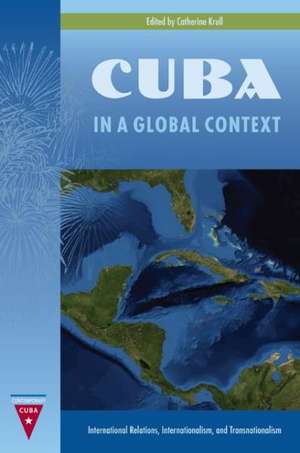Cuba in a Global Context: International Relations, Internationalism, and Transnationalism: Contemporary Cuba (Hardcover)
Louis A., Jr. Perez Editat de Catherine Krullen Limba Engleză Hardback – 13 ian 2014
Preț: 449.61 lei
Preț vechi: 528.95 lei
-15% Nou
Puncte Express: 674
Preț estimativ în valută:
86.06€ • 93.51$ • 72.34£
86.06€ • 93.51$ • 72.34£
Carte tipărită la comandă
Livrare economică 21 aprilie-05 mai
Preluare comenzi: 021 569.72.76
Specificații
ISBN-13: 9780813049106
ISBN-10: 0813049105
Pagini: 334
Dimensiuni: 165 x 236 x 28 mm
Greutate: 0.61 kg
Editura: University Press of Florida
Seria Contemporary Cuba (Hardcover)
ISBN-10: 0813049105
Pagini: 334
Dimensiuni: 165 x 236 x 28 mm
Greutate: 0.61 kg
Editura: University Press of Florida
Seria Contemporary Cuba (Hardcover)
Textul de pe ultima copertă
"Krull has assembled an impressive array of international scholars to examine Cuba's impact on international relations."--Mervyn Bain, author of "Russian-Cuban Relations since 1992" "An anthology of insightful essays that outruns the information blockade on Cuba."--Ricardo A. Dello Buono, coeditor of "Cuba in the Twenty-First Century" There is a great deal more to Cuba's place on the global stage than its contentious relationship with the United States. Taking a refreshing look at Cuban international relations, contributors to this volume from both inside and outside the island explore the myriad ways in which it has not only maintained but often increased its reach and influence. In Latin America, Europe, Africa, and Asia, Cuba has assumed a geopolitical role of unlikely prominence.
Even in the face of the ongoing U.S. embargo, Cubans have seen improvement in the quality of their lives. Shedding new light on Cuban diplomacy with communist China as well as with Western governments such as Great Britain and Canada, these essays reveal how the promotion of increased economic and political cooperation between Cuba and Venezuela served as a catalyst for the Petrocaribe group. Links established with countries in the Caribbean and Central America have increased tourism, medical diplomacy, and food sovereignty across the region. Cuban transnationalism has also succeeded in creating people-to-people contacts involving those who have remained on the island and members of the Cuban diaspora.
While the specifics of Cuba's international relations are likely to change as new leaders take over, the role of Cubans working to assert their sovereignty has undoubtedly, as this volume demonstrates, impacted every corner of the globe. Cuba's domestic and political successes may even serve as models for other developing countries.
Even in the face of the ongoing U.S. embargo, Cubans have seen improvement in the quality of their lives. Shedding new light on Cuban diplomacy with communist China as well as with Western governments such as Great Britain and Canada, these essays reveal how the promotion of increased economic and political cooperation between Cuba and Venezuela served as a catalyst for the Petrocaribe group. Links established with countries in the Caribbean and Central America have increased tourism, medical diplomacy, and food sovereignty across the region. Cuban transnationalism has also succeeded in creating people-to-people contacts involving those who have remained on the island and members of the Cuban diaspora.
While the specifics of Cuba's international relations are likely to change as new leaders take over, the role of Cubans working to assert their sovereignty has undoubtedly, as this volume demonstrates, impacted every corner of the globe. Cuba's domestic and political successes may even serve as models for other developing countries.















